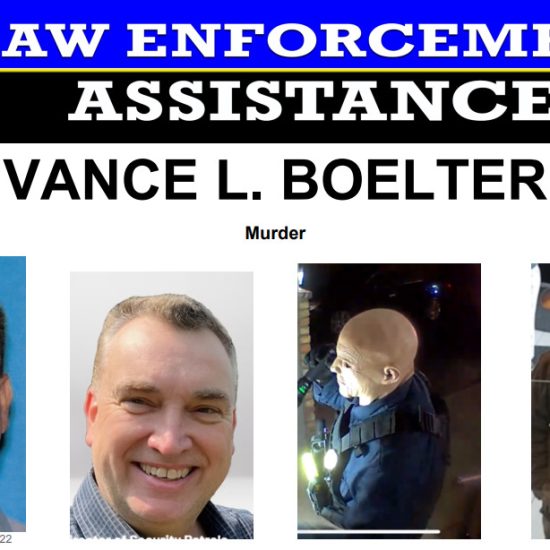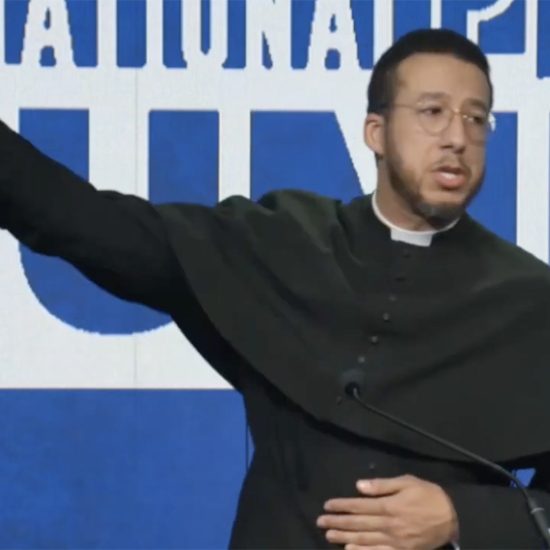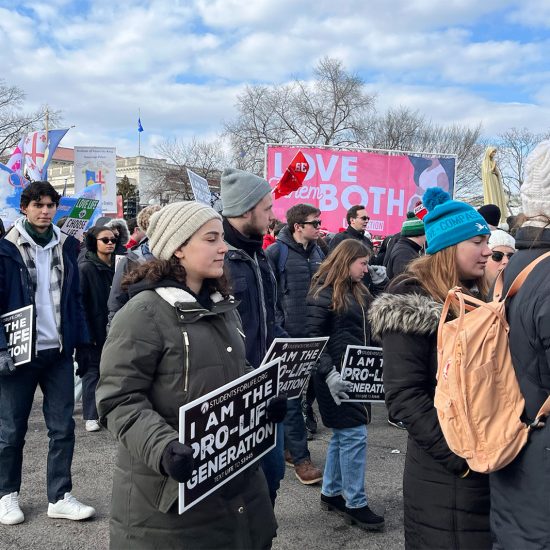ATLANTA (ABP) – After nearly 40 years of polarization over abortion, two speakers at a Mercer University event said Jan. 24 it is time for people who are pro-choice and pro-life to seek common ground to reduce the current number of 1.2 million abortions a year.
Rachel Laser, former senior counsel to the National Women’s Law Center and currently senior vice president for message development at Hattaway Communications, said at a Mercer Lyceum initiative titled “Can We Find Common Ground on Abortion?” that she favors legal abortion and opposes efforts to criminalize it or coerce women against having an abortion.
“My pro-choice views do not prevent me from having common ground on the issue,” said Laser, who formerly worked at the think tank Third Way. “Without differing views there would be no need for common ground.”
While at Third Way, Laser launched the Come Let Us Reason Together initiative, which mobilized evangelical Christians and progressive activists to work together on social issues. She also helped draft and build support for the first-of-its-kind pro-life/pro-choice abortion bill in Congress.
David Gushee, a professor of Christian ethics and director of Mercer’s Center for Theology and Public Life, said he resists abortion not for political reasons but because of a “bias in favor of life.”
Whether one views a fetus as having full personhood or as a stage of development in human life, Gushee said, a decision to terminate a pregnancy is a form of killing.
“Death is the great enemy, and a broken world gives us many deaths we cannot prevent, but we should prevent the deaths that we can,” Gushee said.
Gushee, co-founder and board chair of the New Evangelical Partnership for the Common Good and contributing columnist to media outlets including Associated Baptist Press, said terms describing social issues including abortion as “liberal” or “conservative” are “an accident of history that are not particularly helpful to us.”
So, he said, are ideas such as when life begins. For some, he said, “after birth we have a human being, before birth we have something else.” Gushee said not everyone is convinced that “having made it through the birth canal” merits such a major distinction. He said the “trimester” rule originally adopted but later abandoned in the 1973 abortion case Roe v. Wade, was used because at least some fetuses back then could survive at 28 weeks. Today that has been pushed back to 22 weeks.
Laser said that in an ideal world “every pregnancy would be celebrated,” but in the real world there are good reasons to keep abortions legal. Women may not be able to afford to become a parent. A woman’s health or life could be in jeopardy if she is medically advised not to become pregnant. An unwanted pregnancy can interrupt educational or career paths, destroy relationships with parents or be the result of abusive, damaging or unstable relationships. In a “small but devastating number” of cases, it is due to rape or incest.
While women are “uniquely advantaged” to be able to bear children, Laser said, “They are also uniquely disadvantaged when it comes to an unintended pregnancy, because only women’s bodies are intertwined with the pregnancy.”
At the same time, she said she believes that abortion is “morally complex” because “it involves not just the pregnant woman but also the developing life inside her.”
While not everyone in the pro-choice movement agrees, Laser thinks there is “common ground on abortion” for those who oppose it on moral grounds and those who view unwanted pregnancies as harmful to women.
“My idea of common ground on this issue is working together to reduce the need for abortion,” she said. “It recognizes the moral complexity of the issue without taking away the legal right to abortion.”
Laser advocated policies to prevent unplanned pregnancies, such as comprehensive sex education, teen pregnancy prevention programs, helping parents to communicate with teens about sex and healthy relationships and increased access to contraception for low-income women. She also supports programs that support pregnant women who want to have their babies by expanding Medicaid and SCHIP coverage to pregnant women, support for pregnant students and adoption services.
“Half of all pregnancies in this country are unintended, and roughly half of those end in abortion,” she said. “Attacking the problem of unintended pregnancy would reduce abortion.”
Gushee faulted religious conservatives for “fixating on legal change” in the 39 years since Roe v. Wade.
“People have narrowed their vision to one issue,” Gushee said. “If we can get Roe v. Wade overturned everything will be OK.” But Gushee said if Roe v. Wade were to be overturned without an increased safety net, the result would be more misery for poor women and children.
Gushee said four years ago it looked like there was going to be “an open space” for a common-ground approach to abortion but efforts were stymied by “clusters of powers and interest groups that live to advance their agenda as they see it.”
“I think 40 years of fighting about this issue has made everybody crazy on the extremes,” Gushee said. “Right now I don’t’ think there is a common ground conversation.”
-30-
Bob Allen is managing editor of Associated Baptist Press.






